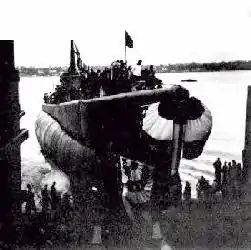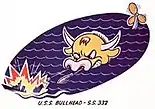USS Bullhead
USS Bullhead (SS-332), a Balao-class submarine, was the last US Navy ship sunk by enemy action during World War II, probably on the same day that an atomic bomb was dropped on Hiroshima. It was the only ship of the United States Navy to be named for the bullhead (any large-headed fish, especially the catfish, miller's thumb, and sculpin). Her keel was laid down by the Electric Boat Company of Groton, Connecticut. She was launched on 16 July 1944 sponsored by Mrs. Howard R. Doyle, and commissioned 4 December 1944 with Commander W. T. Griffith in command.
 | |
| History | |
|---|---|
| Builder: | Electric Boat Company, Groton, Connecticut[1] |
| Laid down: | 21 October 1943[1] |
| Launched: | 16 July 1944[1] |
| Commissioned: | 4 December 1944[1] |
| Fate: | Sunk by Japanese aircraft in the Java Sea, 6 August 1945[2] |
| Notes: | One of the last vessels to be sunk in WW2 |
| Badge: |
 |
| General characteristics | |
| Class and type: | Balao-class diesel-electric submarine[2] |
| Displacement: | |
| Length: | 311 ft 9 in (95.02 m)[2] |
| Beam: | 27 ft 3 in (8.31 m)[2] |
| Draft: | 16 ft 10 in (5.13 m) maximum[2] |
| Propulsion: |
|
| Speed: | |
| Range: | 11,000 nm (20,000 km) surfaced at 10 knots (19 km/h)[6] |
| Endurance: |
|
| Test depth: | 400 ft (120 m)[6] |
| Complement: | 10 officers, 70–71 enlisted[6] |
| Armament: |
|
Operations
Bullhead served in the Pacific Theater of Operations during World War II.
The war operations of Bullhead extended from 21 March to August 1945 during which time she completed two war patrols. Her area of operations included the Java Sea and South China Sea and the Gulf of Siam.
First patrol
During the greater portion of her first war patrol Bullhead performed lifeguard services and on two occasions bombarded Pratas Island, China, damaging enemy radio installations. She also rescued three airmen from a downed B-29 Superfortress following an airstrike on the China coast.
Second patrol
On her second patrol, in May and June 1945 in the Gulf of Siam and the South China Sea, Bullhead sank two small freighters, a schooner and a sub chaser totaling 1800 tons and damaged two more sub chasers and another small freighter, all in gun actions.[7]
Third patrol and sinking

On 31 July 1945 Bullhead left Fremantle submarine base, Western Australia to commence her third war patrol. Her orders were to patrol in a "wolfpack" with Capitaine (SS-336) and Puffer (SS-268) in the Java Sea until 5 September and then head for Subic Bay in the Philippines.
Bullhead reported on 6 August that she had passed through Lombok Strait. That was the last word received from Bullhead. On 12 August, Capitaine, planning to arrive on 13 August, ordered Bullhead to take position the following day in a scouting line with Capitaine and Puffer. Receiving no reply, Capitaine reported on 15 August, "Have been unable to contact Bullhead by any means since arriving in area."
Since the British submarines HMS Taciturn and Thorough, were in the same general area as Bullhead, and Cod (SS-224) and Chub (SS-329) passed through in transit at various times, it is difficult to determine precisely which of the many Japanese anti-submarine attacks was the one that sank Bullhead. However, one occurred on 6 August 1945, when a Mitsubishi Ki-51 from the 73rd Independent Chutai (literally "company" or squadron) of the Imperial Japanese Army Air Force attacked with depth charges. It claimed two direct hits, and for ten minutes thereafter, there was a great amount of gushing oil and air bubbles rising in the water. Since the position given is very near the Balinese coast, it is presumed that the proximity of mountain peaks shortened Bullhead's radar range and prevented her from receiving a warning of the plane's approach. 84 men were lost while serving on USS Bullhead during her service.
Commendations
Bullhead received two battle stars for her World War II service.
References
- Friedman, Norman (1995). U.S. Submarines Through 1945: An Illustrated Design History. Annapolis, Maryland: United States Naval Institute. pp. 285–304. ISBN 1-55750-263-3.
- Bauer, K. Jack; Roberts, Stephen S. (1991). Register of Ships of the U.S. Navy, 1775–1990: Major Combatants. Westport, Connecticut: Greenwood Press. pp. 275–280. ISBN 0-313-26202-0.
- Bauer, K. Jack; Roberts, Stephen S. (1991). Register of Ships of the U.S. Navy, 1775–1990: Major Combatants. Westport, Connecticut: Greenwood Press. pp. 275–280. ISBN 978-0-313-26202-9.
- U.S. Submarines Through 1945 p. 261
- U.S. Submarines Through 1945 pp. 305–311
- U.S. Submarines Through 1945 pp. 305–311
- Bullhead's 1945 records claims are one ship sunk 30 May; one ship sunk 18 June; one ship sunk and three damaged 19 June and one ship sunk 25 June; for confirmation of two ships sunk by Bullhead 18 & 19 June – see
- This article incorporates text from the public domain Dictionary of American Naval Fighting Ships. The entry can be found here.
External links
| Wikimedia Commons has media related to USS Bullhead (SS-332). |